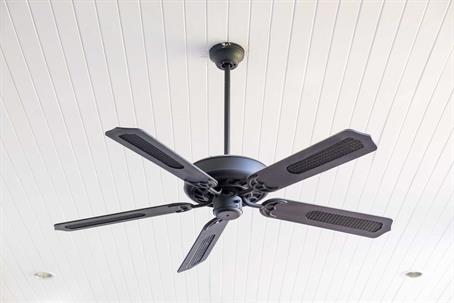Now that we are firmly in the peak of summer in Las Vegas, it is important to know about all the ways in which you can improve airflow around your home. Being in the know will help keep yourself comfortable while the worst of the heat passes during the day. With that being said, there are many benefits to increasing airflow in your home that go beyond its cooling effects.
The Benefits of Good Airflow
The average person will breathe around 12,000 liters of oxygen in a day and expel similar amounts of carbon dioxide. Improving airflow around your home will, first and foremost, ensure that there is ample oxygen in your home and remove pollutants like smoke, chemicals, debris particles and carbon dioxide, making your home a healthier place. Of course, if you want to remove these completely, extractor fans will be necessary, rather than ceiling fans. Good interior airflow can also make you feel cooler when the temperatures outside are at its peak.
Will a Ceiling Fan Improve Airflow?
Simply put, yes - a ceiling fan will definitely improve airflow around your home. After all, moving air around to increase comfort and impact the internal environment of a home is a fan's main purpose. There are a number of things that many people don't know about ceiling fans and the ways in which they work, however, we’ve got you covered. Here's all you need to know:
1) Direction Matters
Ceiling fans can be used to both provide heating and cooling effects in tandem with your home’s HVAC systems and the direction in which they turn has a lot to do with that. Turning a fan so that its blades move clockwise will push warm air down from the ceiling and create a warming effect. However, having the blades move counter-clockwise will pull air upwards, circulating cool air from below.
2) Speed Maximizes the Cooling Effect
If you want to use the airflow that ceiling fans can create to heat your home, you should keep the speed of your fan low. Fan blades moving at a high speed will instead have a cooling effect upon the room by increasing airflow fairly dramatically.
3) Fans Produce Heat
While it may seem strange to say this, electric ceiling fans actually generate heat. This is due to the electric motor which runs the fan and allows the blades to turn. So, a fan running in a room that is not in use will not cool it down, but instead heat it up by a fraction.
4) Airflow Creates an Effect, Not a Result
As we have mentioned, the motors in ceiling fans actually generate heat and increase airflow but it does not actually cool the space. Instead, they create a cooling effect because of the way that the airflow wicks sweat away and the way in which the air moves over the skin.
As you may have gathered, ceiling fans can and do increase airflow and are effective when they work in tandem with Las Vegas HVAC systems, however they cannot be considered a replacement for them. Your home’s HVAC unit and extractor fans are still the best ways to control the interior climate in your home.
If you find that your home’s AC system is not running efficiently, there may be underlying issues that should be inspected. Our team of highly trained experts can help diagnose the concerns in person or virtually. To speak to a member of our team, feel free to give us a call at (702) 766-9436 or contact us here.

